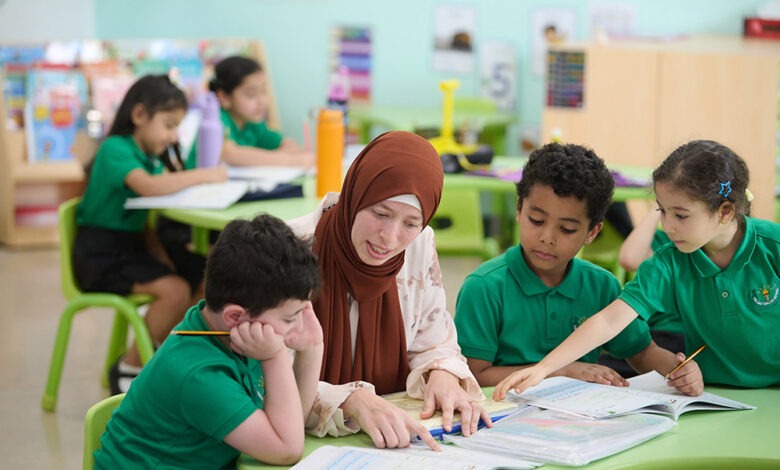Enhancing teaching, a strategic investment in Kuwait’s future

THE TIMES KUWAIT REPORT
An educated and skilled workforce is vital to the social and economic development of nations. Faced with fast changes taking place in academic, technological, economic, societal, and environmental spheres in the 21st century, countries are revamping education to keep pace with these transformations and meet the rapidly evolving demands of marketplaces.
In line with this thinking, Kuwait has made empowering human resources and developing creative human capital a key pillar of its ambitious New Kuwait Vision 2035. Reasoning that effective and sustainable development of human resources begins at the school level, the government is in the process of incorporating learning and teaching reforms in schools, and modernizing the curriculum to keep abreast of global developments.
As part of advancing Kuwait’s new education agenda, Minister of Education Sayed Jalal Al-Tabtabaei is reported to have met early this year with the Director of Education and Skills Department at the Organization for Economic Cooperation and Development (OECD), Dr. Andreas Schleicher. The meeting focused on developing a collaboration between Kuwait’s Ministry of Education and the Education and Skills Department at OECD, to reorient Kuwait’s school curriculum and make it relevant to the global changes underway today.
The OECD collaboration envisions curriculum reforms focused on, among others, improving reading, mathematics, and science skills, and implementing the OECD’s ‘Programme for International Student Assessment’ (PISA)—which measures the ability of 15-year-old school children to use their reading, mathematics and science knowledge and skills to meet real-life challenges—as well as the organization’s ‘Future of Education and Skills 2030’ framework, which aims to build the knowledge, skills, attitudes and values that students need in the 21st century.
However, to successfully implement education reforms and enhance academic quality it is vital to have trained and motivated teachers. Empirical evidence from studies worldwide indicate that supporting, training, motivating, and enhancing proficiencies of teachers continuously are fundamental characteristics of high-performing education systems.
Teachers form the backbone of education systems and are crucial to the proper development of children in their most formative years. Qualified and committed teachers not only help students to advance their subject knowledge and keep abreast of new-age technological advancements, but also develop in them creative and critical thinking skills, and help build resilience to adverse impacts. Teachers act as guides and mentors to young minds, and serve as role-models whose principles, values, and behaviors children tend to emulate as they grow up.
Teachers are also among the ones who shoulder the highest responsibility in nation-building, and in the renaissance and future of the country. They prepare students—who are the true assets in the nation’s future—for the rapid social and technological challenges taking place, and equip them to face potential future challenges. Additionally, teachers instill values and principles in students and imbue in them the traditions and heritage of their country, thereby preserving and enhancing national identity in the hearts of young people.
It is reassuring that the collaboration in education-reform with the OECD also involves developing training programs and creating professional development opportunities for teachers, as well as introducing a teacher licensing system to evaluate competencies in the teaching profession. The collaboration will also see the creation of a national task force to oversee the reform implementation process and regularly assess its progress, in achieving international quality standards and making the education system globally competitive by the end of the decade.
The ongoing curriculum and teaching reforms aim to address persistent challenges identified in the education sector by the World Bank and other entities. In particular, experts point to teaching inefficiencies and education outcomes that do not align with Kuwait’s high spending on this sector. This is evidenced in the country’s consistent low ranking in global assessments of student performance, and in the mismatch between available youth skills and labor-market needs.
In a related statement, the ministry of education recently affirmed commitment to providing teachers with training and professional development opportunities that enable them to keep pace with advancements in education and technology. By empowering, motivating and supporting teachers to enhance their proficiencies, pedagogical approaches, and teaching modalities, as well as elevating their profile in society, the ministry seeks to highlight the value and impact of teachers on the future of Kuwait
In the wake of discussions with the OECD official, Minister Al-Tabtabaei also instructed directors of relevant sectors within the ministry to form specialized teams. The teams are tasked with immediately implementing the necessary procedures to collaborate with the OECD experts, and to ensure that the goals outlined in the joint plan for curriculum development are achieved within the agreed upon timeframes.
Additionally, in July this year, the education minister approved plans for the comprehensive development of school curricula in grades one through nine, to be implemented in the current academic year. The new curriculum stresses learning that incorporates the rapid global advancements in artificial intelligence (AI), cybersecurity, digital learning, and includes a national framework that preserves social values, as well as introduces new modalities in teaching.
The reform process also includes integrating AI into the Grade 10 curriculum, in alignment with education policies that have identified AI skills as essential to meet labor-market demands driven by rapidly evolving digital technologies. The revamping of curriculum also seeks to adopt global best practices from countries known for their scholastic achievements and academic excellences, including Finland and Singapore.
The holistic education reform strategy, with its emphasis on improving education quality and enhancing learning outcomes, is considered foundational for fostering a generation equipped to successfully address future global challenges. The reforms also align with Kuwait’s Vision 2035 that aims to develop a knowledge-based society. As such, the reforms should be viewed as a long-term investment strategy that drives sustainable social and economic transformation, and supports Kuwait’s renaissance as a regional hub fostering educational advancements.
However, sustaining the education reform momentum will require more than policy announcements and on-paper processes. Previous attempts at education reforms were often derailed by the lack of support amid prevailing political instability. Successful education reforms hinge on effective and transparent implementation of plans and policies, consistent funding, measurable performance outcomes, and firm commitment by everyone involved in the process. Laudably, the new reforms appear to have widespread support from all education stakeholders.
Interestingly, a decade into the adoption of the 2030 Sustainable Development Goals (SDG), the latest annual report by the United Nations on the status of SDG highlights the precarious state of several goals, even as the 2030 deadline looms. More positively, while the section on education (SDG 4) paints an overall dismal picture of progress, it also highlights several educational gains, including that more than 110 million children have entered school since 2015, when 121 million children were out of school.
Additionally, the report shows that global school completion rates in 2024 reached 88 percent for primary, 78 percent for lower secondary, and 60 percent for upper secondary education—up from 85, 74, and 53 percent, respectively in 2015. Youth literacy rose globally from 91 percent in 2014 to 93 percent in 2024, while adult literacy went from 85 percent to 88 percent; over half of youth aged 15–24 were engaged in education or training in 2024—up 10 percentage points from 2000.
A large part of the gains achieved in global education can be attributed to progressive, far-sighted policies by governments, availability of consistent funding and resources to sustain education momentum, and more importantly, to the legions of committed, trained, and supported teachers who strive to make a difference in education everyday, and prepare students to overcome challenges today, and in the world of tomorrow.












